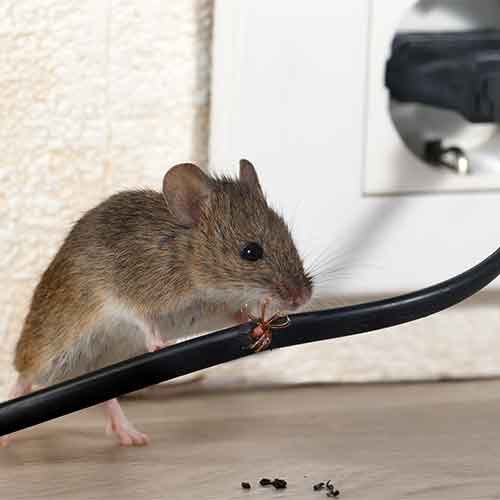Mouse in the House? Trust the Experts at Smash Pest Control for Rodent Control Services
It’s the middle of the night and you feel a little thirsty. You climb out of bed and groggily make your way to the kitchen for a sip of water. On the way back, it happens. Out of the corner of your eye, a shadowy blur scurries around a corner and darts under the oven. It could be your eyes playing tricks on you or it might be one of the most common household pests there is: a house mouse. Mice are social critters and you can be sure that if you see one, there are several more close by. Stop a growing infestation in its tracks and contact Smash Pest Control for pest control services today.
Are There Different Types of Mice?
Rats and mice have adapted remarkably well to living in close association with humans. There are three types of common rodents found in Tennessee – the Norway rat, the roof rat, and the house mouse. However, field mice and deer mice can also occasionally take shelter in your home.
When a rodent scampers by you, it can be hard to tell exactly what you’re dealing with. In general, mice are smaller than rats – mice typically range between two and a half to four inches in length (not including the tail). Rats have an average body length spanning six to nine inches depending on the species. If you can bear to look a little closer, the tail can help you identify your four-legged intruder. Mice have long, thin tails that are about as long as their bodies whereas rats have longer, thicker tails that are usually longer than their bodies.
The most frequently encountered pest for homeowners, though, is the house mouse. While these pests only live about a year, they are prolific breeders as females can produce six to 10 litters a year with four to seven pups in each one. That can make controlling mice very difficult and ultimately, you should leave the job for a professional like Smash Pest Control.
Are Mice Dangerous?
Mice can contaminate food and damage clothing, furniture, books, and many other items by their gnawing. They can also cause damage to walls, doors, insulation, and other structural components by gnawing and burrowing. Mice have been known to chew through utility pipes and electrical wiring, causing fires, indoor flooding, power outages, and equipment failure.
Mice are disease transmitters because they are common hosts for parasites like fleas and ticks. They can carry illnesses like Hantavirus, Salmonellosis, and Leptospirosis. Mice urinate frequently to mark their territory and establish trails for travel, so they contaminate food easily.
If you find evidence that a mouse has successfully accessed a food item – e.g. there is a box of cereal in your pantry that has been chewed through – throw it out. It’s also important to thoroughly sanitize any surface that may have come into contact with a mouse.

What Attracts Mice to My Home?
Mice are simple creatures and when it comes down to it, all they want is shelter and sustenance. Your home may be a bigger draw to mice if you have any of the following:
- Reliable access to food. Mice are much harder to evict when they have easy access to food. They don’t need too much either as they can make do with crumbs on countertops, spills on floors, pet food, pantry items, and even food scraps in uncovered trash cans.
- A consistent water source. Like all creatures, mice need water to survive. A leaky pipe, dripping faucet, and standing water are go-to watering holes for the mouse community.
- A place to warm up. During colder months, it’s natural for us to hunker down inside to stay warm. Mice aren’t really different from us in that regard. When temperatures dip, mice are more likely to seek shelter indoors. Cracks and gaps around doors and windows can provide entry points for mice looking for a cozy place to ride out the winter.
- Too much clutter. Mice like chaos and a cluttered space is where they thrive. Those open boxes and that old furniture you stored in your basement a few years ago and forgot about are perfect hiding spots for mice to build nests.
- Vegetation around the exterior of your home. We appreciate a commitment to curb appeal, but your new rose bush could provide cover for mice as they scope your house for access points.
How Do I Get Rid of Mice in My House?
Step one: call Smash Pest Control. That’s it. Your work is done… Okay, it isn’t quite that easy.
Getting rid of mice takes a collective effort from us and the homeowner. Mice can squeeze through small openings and cracks in walls, floors, and foundations. They can slip through gaps around electrical lines, vents, and pipes to get into your home. This is why we recommend forgoing DIY attempts at rodent control. We deploy a combination of baiting, trapping, and pest prevention to make your home mouse-free. Your technician will discuss a more customized plan with you during your appointment.
Stop Mice From Moving In
No one wants to share their home with pests, especially mice. They’re unsanitary, destructive, and can pose a danger to your health. When you spot a single mouse, it’s unlikely it’s alone. Don’t wait until the infestation is out of control, call Smash Pest Control as soon as possible. The quicker we can get started on eliminating your mouse problem, the quicker you can get back to enjoying your safe space. Reach out to us by calling 615-551-4029 or request your free quote online.
You don’t want to have to endure an invasion of rats. Our Pest Guide can fill you in on some warning signs to watch for.
